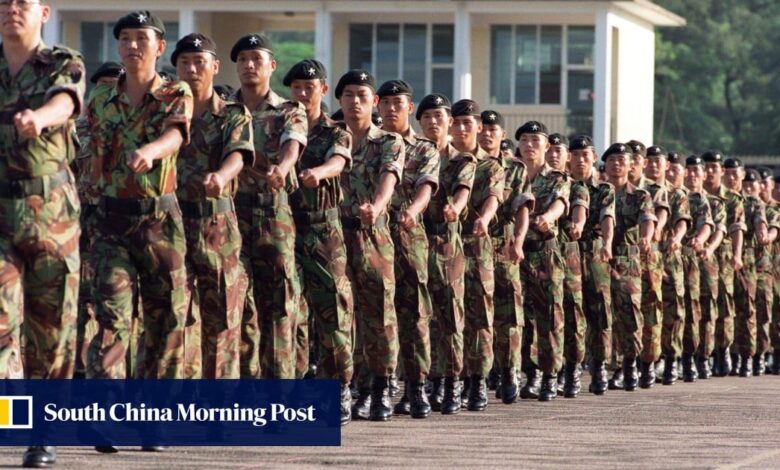UK expands residency scheme to include family of deceased Hong Kong soldiers who served in army, including Gurkhas

Britain expanded a programme to allow the spouses and children of deceased Hong Kong soldiers who had served in its army, including Gurkhas, to settle in the UK, but a veterans’ association head on Wednesday criticised the criteria as too stringent.
The British Home office announced in March that Hongkongers who had served in the armed forces before the city was returned to Chinese sovereignty in 1997 would be allowed to live and work in the United Kingdom and become eligible for citizenship. Partners and children of ex-soldiers can also apply.
The scheme also covers Gurkhas, a long-standing Nepalese brigade that fought in missions across the British Empire from 1815, including in the city.
Last Thursday, authorities extended the programme to also cover the partners and children of deceased military personnel. New details of the requirements for all types of dependant applicants were also announced.
The Home Office said in March that about 1,000 people, including veterans and their dependants, were eligible for resettlement under the scheme. Authorities have not provided an estimate on the number of individuals who meet the requirements following the expansion of the programme.
Applications can be filed from the UK or overseas and ex-soldiers must have completed at least four years of continuous military service, according to the Home Office.
‘Little interest’ in UK residency offer to ex-soldiers of British army in Hong Kong
‘Little interest’ in UK residency offer to ex-soldiers of British army in Hong Kong
“If the applicant is applying as a bereaved partner, they must provide a death certificate for the Gurkha or Hong Kong military unit veteran,” it said, adding that the applicant must not have remarried.
For the children of veterans, they must have been under the age of 18 on the date the military service member was discharged.
Candidates must also have lived in the same household as the former soldiers for more than two years continuously before the application, unless they were unable to do so due to educational pursuits, and had not established independent family units.
The Hongkongers seeking new lives in Britain on BN(O) scheme
The Hongkongers seeking new lives in Britain on BN(O) scheme
Albert Lam Ping-wai, chairman of the Hong Kong Ex-Servicemen’s Association, said the requirements for children of ex-soldiers were too harsh.
“Most of the sons and daughters of the soldiers are already in their 40s and even 50s, how can the UK government require them to still live with their parents for more than two years. Most of them are married and have their own kids,” he said.
Lam, who served in the British armed forces for 24 years starting in 1973 and rose to the rank of captain, was an estate manager at the University of Science and Technology before retiring.
He said some veterans might be interested in applying, but most of the ex-servicemen were over the age of 70, like him, and were not keen on moving to another place.
He also said the application fee of around £1,800 per head was too expensive, especially given the request was not necessarily approved.
105,000 Hongkongers start new lives in UK since BN(O) visa scheme began in 2021
105,000 Hongkongers start new lives in UK since BN(O) visa scheme began in 2021
He said the working group on right of abode in the UK under his association would express its concerns to the British government in the hopes that the requirements could be eased.
The new settlement route for Hong Kong veterans builds on an existing one rolled out in 2009 for former Gurkhas.
Under the British Nationality Selection Scheme launched in 1990, 50,000 Hong Kong families were given the right of abode in Britain.
Some 500 places were given to military personnel under a points system based on criteria including rank. About 1,600 members of the former Hong Kong Military Service Corps and the Hong Kong Royal Naval Service missed out.





